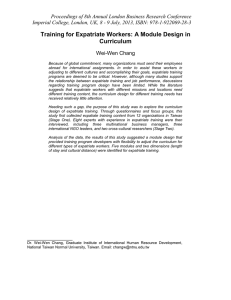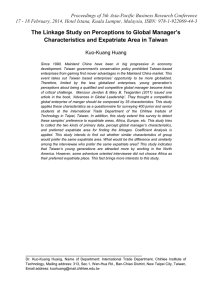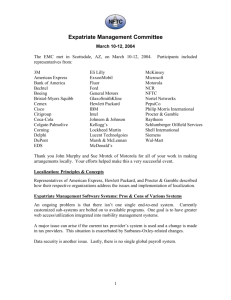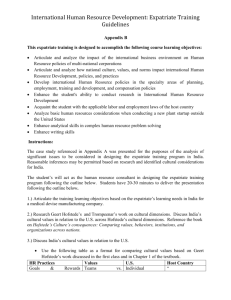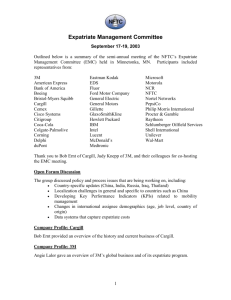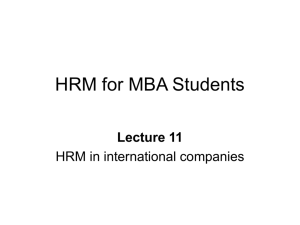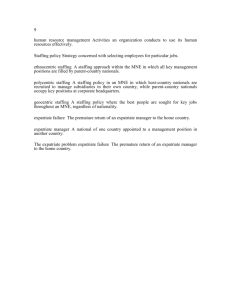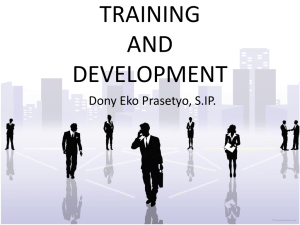PERSPECTIVES ON BRITISH EXPATRIATE SCIENCE TEACHERS IN A CARIBBEAN CONTEXT
advertisement
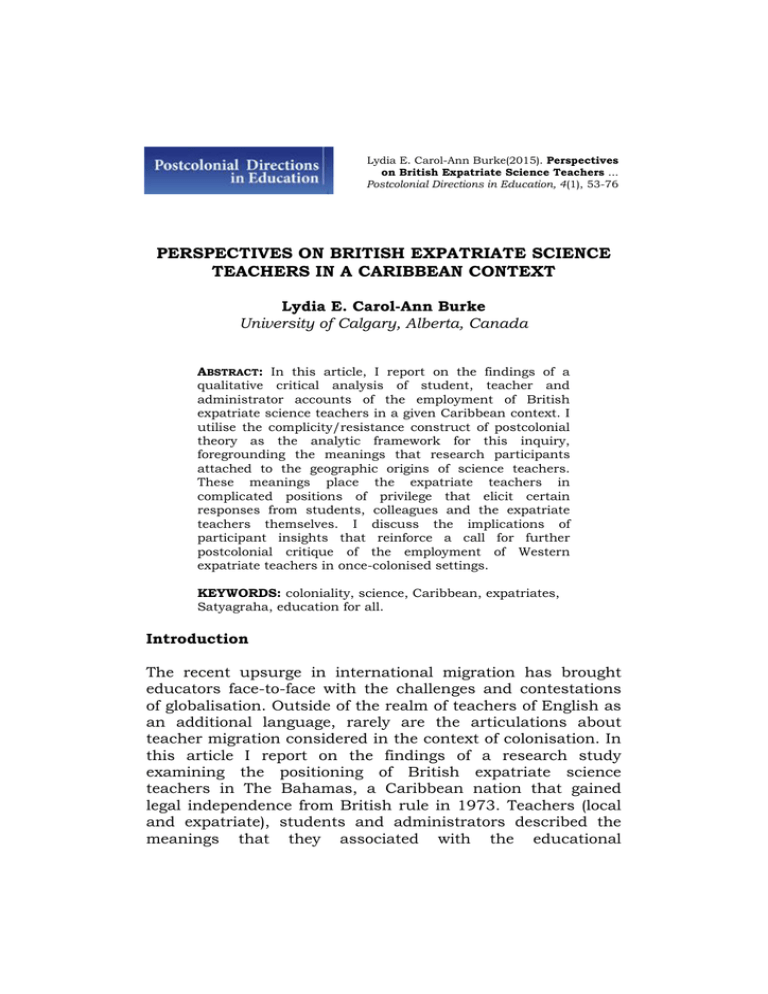
Lydia E. Carol-Ann Burke(2015). Perspectives on British Expatriate Science Teachers ... Postcolonial Directions in Education, 4(1), 53-76 PERSPECTIVES ON BRITISH EXPATRIATE SCIENCE TEACHERS IN A CARIBBEAN CONTEXT Lydia E. Carol-Ann Burke University of Calgary, Alberta, Canada ABSTRACT: In this article, I report on the findings of a qualitative critical analysis of student, teacher and administrator accounts of the employment of British expatriate science teachers in a given Caribbean context. I utilise the complicity/resistance construct of postcolonial theory as the analytic framework for this inquiry, foregrounding the meanings that research participants attached to the geographic origins of science teachers. These meanings place the expatriate teachers in complicated positions of privilege that elicit certain responses from students, colleagues and the expatriate teachers themselves. I discuss the implications of participant insights that reinforce a call for further postcolonial critique of the employment of Western expatriate teachers in once-colonised settings. KEYWORDS: coloniality, science, Caribbean, expatriates, Satyagraha, education for all. Introduction The recent upsurge in international migration has brought educators face-to-face with the challenges and contestations of globalisation. Outside of the realm of teachers of English as an additional language, rarely are the articulations about teacher migration considered in the context of colonisation. In this article I report on the findings of a research study examining the positioning of British expatriate science teachers in The Bahamas, a Caribbean nation that gained legal independence from British rule in 1973. Teachers (local and expatriate), students and administrators described the meanings that they associated with the educational Postcolonial Directions in Education experiences and geographic origins of British science teachers working in The Bahamas. The contemporary positions of British expatriate teachers are historically embedded. The expatriate teachers occupy a space of complexity described by a dynamic and continuing association between discourses of coloniser and colonised. These British teachers have come from a country that once dominated much of the Caribbean, and they work with curricula established to reinforce social inequities that once progressed imperialist objectives. Agreeing with Said’s (1993) assertion that imperialism has established the framework of globalisation, I employ a postcolonial framework in my analysis of perspectives on British expatriate science teachers. My aim is to use the deconstructive emphasis of postcolonial theory to explicate issues associated with the employment of these expatriate workers. Particularly important are notions of complicity and resistance that mediate the ways in which science students respond to both experiences of oppression and the subjugation of knowledges that the students value. Background to the study In 2006 I made a successful application in response to a listing in the Times Educational Supplement for a high school science teacher in The Bahamas. I loved teaching and, although I was born and educated in the UK and had worked for more than a decade as a science teacher holding a range of positions of responsibility, I felt that I still had the energy and enthusiasm for a new kind of educational challenge. Being of Caribbean origin—both of my parents were born in the Caribbean and I was an active participant in Caribbean communities in the UK—I was keen to experience this challenge in a setting where I could learn from, and contribute to, a geographic region from which I felt I had already gained so much. I was given a two-year contract to work within the private school system—something I had resisted in the UK but which was the only option available to me in the Caribbean at that time. The learning curve was steep and I found that I was frequently required to re-evaluate what I had taken for granted about science, teaching, learning, students, and myself. I was particularly struck by the way in which my 54 Vol. 4, No. 1, 2015. immersion in this unfamiliar context revealed just how heavily my British education had influenced the way that I interpreted the curriculum: something I had not felt the need to examine when teaching in the country of my birth. The fact that the country’s constitution emphasised the centrality of religious knowledges in Bahamian life caused me to contemplate on my role as a science teacher, presenting what some might classify as ‘counter-knowledge’. In addition, ancestral knowledges, such as the use of bush medicines, were being considered for inclusion in science curricula. I was not used to such explicit and sanctioned cultural considerations being given prominence within the culture of science education. I remained at the school for a total of three years during which time I often reflected on how my unique combination of circumstances was shaping my impression of what it meant to be an expatriate teacher. I became increasingly intrigued by the apparent contradiction of recruiting teachers into a country from a nation that had previously colonised that country. As time went on my awareness of explicit and unspoken power plays grew; these seemed to delimit my positioning as a science teacher and the responses available to my students. Two years after leaving the school I returned to The Bahamas to conduct research on science education in what I described as ‘intercultural’ spaces. In this article I outline one aspect of my research that explores how students, administrators, and teachers describe and respond to the positioning of British expatriate science teachers. The postcolonial lens In this article, I privilege postcolonial theory as a means by which the positioning of expatriate science teachers may be interpreted. Positioning refers to how social rules (both explicit and implicit) reinforce the roles or parts that people assign for themselves and to which people are assigned by others (Ritchie, 2002). I am particularly concerned with the way in which the geographic origins of science teachers contribute to the construction of teacher positions. Since teacher positioning is a co-construction, negotiated in relation to others participating in a given community, my study looks at perspectives expressed by teachers (local and expatriate), students and administrators in the educational setting. The 55 Postcolonial Directions in Education position that the teacher occupies indicates a certain power status that is available to that teacher, as well as the power statuses available to his or her students and colleagues as they interact with that teacher. Acknowledging the range of themes explored by postcolonial theorists, I focus my analysis on the complicity/resistance dimension of responses to expatriate science teacher positioning. This emphasis necessarily responds to issues of power, agency, negotiation, subjectivity, and nationalism that are alluded to in Matthews’ (2009) observation that, for some science education theorists: Western science was just one ideology among many, and its supposed “truths” were just the outcome of negotiations where the winning side simply had better rhetorical skills or more power, they did not have more truth or better agreement with the world. (p. 644) I consider that the search for truth or attempts to discern patterns of reality are valid endeavors but the subtle challenge in this work is to examine how the reporting of such endeavors serves to validate hegemonic positionings. As with any hegemonic enterprise, the teacher’s power to pronounce knowledge is associated with a complex interaction of mechanisms that facilitate or resist dominance over alternative knowledges and/or individuals. I have presented complicity with, and resistance to, this dominance as part of the same analytic dimension in order to reinforce their interconnectedness but this is not to say that their relationship is linear. Although complicity and resistance might reasonably be thought of as representing opposing positions on a continuum, it is also possible to conceive of these terms as being intimately related and intersecting. By way of illustration, Gandhi’s (1958) philosophy of Satyagraha might be perceived, by some, as constituting a compliant approach due to its emphasis on enduring the oppressor’s expressions of anger, without complaint, or counteracting unjust acts of violence perpetrated by the oppressor.1 However, Gandhi’s conception is distanced from his earlier notion of passive resistance in that Satyagraha describes using the force of truth and justice to convert the oppressor. Satyagraha represents a portmanteau term composed by the contraction of two Sanskrit words: satya (truth) and agraha (force). 1 56 Vol. 4, No. 1, 2015. This approach is manifest in non-violent acts of resistance aimed at appealing to the conscience, rather than merely the behavior, of the oppressor. Thus, the complicity/resistance dynamic incorporates a nuanced intersection of responses to domination that are not always expressed as perceptible actions; these responses include deliberately subversive behaviors, unconscious acceptances, and conscious reappropriations. Parry (1994) described the challenge of reading refusals and compliance from within a Eurocentric framework. She warned that the ways in which others assert their identities can often violate our notions of rational protest, being read as anarchic or nihilistic. She encouraged a contextual reading that considers historicity, questions simplistic assumptions of imitation and traces indicators of re-creation that do not seek the political ends presumed by the dominant discourse. In this study, Western modern science with its reliance on a particular form of logic—“propositional analytic deduction” (Taylor, 2008, p.883)—is mobilized by local and expatriate teachers negotiating culturally-complex spaces of historical and contemporary conquest and oppression. In this scenario, teachers, students and/or administrators could act as agents of colonisation, either knowingly or otherwise, facilitated by the tool of Western modern science. In the section below, I trace a brief history of the development of the science curriculum in the Englishspeaking Caribbean to provide a context for the contemporary interpretations and communications that are presented by participants in this study. Foucault described this genealogical approach as an exploration of “the union of erudite knowledge and local memories which allows us to establish a historical knowledge of struggles and to make use of this knowledge tactically today” (Foucault, 1980, p. 83). Framing the science curriculum within its historical setting also provides insight into intents that may have remained embedded in the curriculum structure and content. Marxian ideology and postcolonial theory were used by Deng and Luke (2008) to emphasise the point that it is wrong to assume that knowledge can ever be truly devoid of ideological or sociocultural interest. So, curriculum contextualisation is fundamental to this kind of study. As with any historical account, I acknowledge the presence of alternative versions of 57 Postcolonial Directions in Education actions and motivations and present the narrative below as a plausible explanation of events. An historical context for science education in the Englishspeaking Caribbean The spread of the British Empire was grounded in the struggle to control ‘resources’, many of whom were human. This exercise in “managing inequality” (Lewis, 2011, p. 25) was facilitated by an interplay of coercion and conquest under the mask of a moral mission to ‘civilise’ those who were unable, or unwilling, to help themselves. In her overview of the educational history of the British Caribbean, King (1995) emphasised the class distinctions supported by national systems of education introduced during the colonial period and expanded after the abolition of slavery in the 1830s. These systems were established to educate the children of expatriates and select locals, incorporating testing structures that would provide the best students with the chance to take the Cambridge examinations and potentially win a scholarship to study at a British university. These ‘island scholarships’ provided scope for social mobility but only for those who fit the intellectual mould and complied with the educational expectations that would secure a ‘golden ticket’ to further study (Harrison, 2011). This early postemancipation curriculum prioritised literacy, numeracy, and religion as foundational knowledge at the primary school level. Study of the natural sciences was adopted by certain secondary schools, mirroring educational development in England. The new wave of imperialism that followed slave ‘emancipation’ sought to assimilate the formerly subjugated populations into a “regime of global government” (Tikly, 2009, p. 23) that distanced itself from discredited notions of race as a context for legitimising inequity. The newly-embraced concerns of cultural difference overshadowed talk of race and were articulated in Western discourse as ‘development’. Tikly identified the allusions to development as being rooted in the Enlightenment promise of social progression as a result of rational measures to promote harmonious systems, as are observed in nature and aspired for in European academic centres. To ensure that the educational provision in the 58 Vol. 4, No. 1, 2015. colonies was comparable to that of English secondary schools, English expatriate teachers were recruited into colonial schools (King, 1995). Just as the sociopolitical tide was shifting, so were school curricula. Shapin (2010) described the pervasiveness of a form of nineteenth- and early twentieth-century thought that supported the shift in cultural authority granted to science, replacing the position previously held by religion. He credited George Sarton (the founder of the History of Science discipline) and August Comte (the founder of the Sociology discipline) with the notion of science embracing a moral vision for humanity, driving humanity to its highest and noblest ideals. Since the 1960s, when many Caribbean nations started gaining independence from colonial rule, those high ideals of science were incorporated into school curricula. Tracing the rapid expansion of educational provision in developing countries during the 1960s, Lewin (1992) described the appropriation of existing science syllabuses (designed for the élite) as being the norm for countries experiencing the first phase of independent governance. He stated: In those countries with a colonial experience that penetrated the fabric of their education systems deeply, science educational practice shadowed that in industrialized countries. Syllabi were borrowed, or perhaps more accurately lent (Little 1990), with little more than cursory attention to local conditions. They closely resembled those to be found in the more conservative parts of the education systems of the ex-colonial power. Thus in the case of British ex-colonies throughout the world there are many examples of mildly modified General Certificate of Education (G.C.E.) type science rubrics for secondary schools current in the United Kingdom in the 1960s, and even those derived from the School Certificate which preceded G.C.E. (p. 10) It should not be assumed that the post-independence use and expansion of a pre-existing education system necessarily marks the endorsement of the system and its curricula as being suitable to local needs or logically the most effective system; the decisions to expand established education systems are likely to have been taken on more pragmatic grounds. Luitel (2007) suggested that, any developing country hoping to participate in the global economy feels the necessity to engage with the education systems of the global 59 Postcolonial Directions in Education superpowers, despite the perceived compliance with Western hegemonic practices. Given this consideration, and the historical context of educational development in the Caribbean, it is hardly surprising to note that local science curriculum reform in the English-speaking Caribbean continues to mirror the reforms of the national system of education in England. In addition, many Caribbean private schools—which represent élite organisations within their geographic contexts—still seek support in development and interpretation of these curricula from British expatriate workers. Methodology: a qualitative critical analysis Browne and Smye (2002) remind us that “our theoretical assumptions guide our methodology” (p. 38). This assertion is particularly meaningful for researchers conducting work using a postcolonial analysis. For me, it has meant that I was concerned about the discourses carved out of the intersection of culture, history and sociopolitical relations (Browne and Smye, 2002) that have elevated science education to a gatekeeper status, serving to regulate student access to further educational opportunities, often outside of The Bahamas. It is important for contemporary descriptions of science education to be read in a critical sense, supported by historical insights that avoided reductive interpretations that would attribute science education challenges to the culture of the student or the expatriate teacher. I used an interpretive approach to look for meaning in the stories and illustrations that were shared by participants. Tobin (2000) described interpretive research in science education as acknowledging researcher subjectivity while insisting that the researcher learns through “systematic activity focused on efforts to understand the interactions between participants in social settings in terms of the perspectives of the participants” (p. 488). I identified the depictions presented as commentary that exists in the given society rather than the fixed perspectives of the disclosers. (My own positioning within the research context has been described more fully in Burke, 2014.) Based on a research protocol that I have described extensively elsewhere (Burke, 2015), I conducted a series of 26 60 Vol. 4, No. 1, 2015. in-depth narrative-gathering episodes (interviews) with a selection of high school students (or recent graduates), teachers (expatriate and local), and administrators (directly involved in the recruitment of high school science teachers) from seven different educational institutions (five private and two public). The study explored a range of science-related themes but in this article I will discuss only the components associated with the positioning of British expatriate science teachers. The research participants contacted me, based on materials circulated on my behalf by former students and colleagues. Each interview consisted of two key components, the first was a series of open-ended free-response questions, provided to the participants in advance of the interview that included a question about what British science teachers bring to, or take away from, the Caribbean context within which they work. In addition to the questions, I had prepared a set of statements that had been adapted from research literature on science teaching in intercultural settings. I used the statements to provide points of engagement around which participants could express their thoughts about the given science educational context. I asked participants to express the extent of their agreement or disagreement with each statement as well as to provide an explanation for each decision. Examples of statements used included: British science teachers could learn a lot from Caribbean ways of understanding the world. There is a difference between the teaching style of British teachers and the teaching style of Caribbean teachers. British teachers need to understand the backgrounds of their students in order to teach science well. We should only use Caribbean science teachers in Caribbean classrooms. Each interview was audio-recorded and I made reflective field notes after meeting with each participant. The findings detailed in this article were the result of a constant comparative analysis (Strauss & Corbin, 1990) of transcripts and field notes guided by the question: How do research participants describe and respond to the positioning of British 61 Postcolonial Directions in Education expatriate science teachers? This analysis was supported by the use of the NVivo 10 qualitative data analysis software that allowed me to trace coding pathways and histories in order to map the development of themes. Three themes were derived that are addressed below: Distinguishing characteristics of the British expatriate teachers, The power of rhetoric, and The meaning of independence. The reader will notice that I have not presented detailed information about individual participants in this article; this was done in order to limit the potential for participant identification in a location employing a small pool of British expatriate science teachers. For this same reason, I have not always used gender identifications provided by the participants. It is not my desire to trace specific teachers, their colleagues or their students, instead I have only identified speakers according to their designation within the school system to indicate their positioning within the power structure of a school. An exploration of the research findings British expatriate science teachers in this study readily identified and acknowledged the inadequacy of their prior understandings in equipping them for success in their new cultural context. Defining success by the likelihood of remaining in The Bahamas beyond the term of the initial contract, each teacher was able to identify how he or she was driven to a greater level of reflection than initially anticipated due to the challenges presented by a national system that supported religious and ‘folk lore’ truth systems that were valued by so many students. As one expatriate teacher put it: “we didn’t understand Bahamian religion and that is the big difference between me and my students and me and other members of staff.” This lack of understanding was recognised as problematic but did not seem to alter the historicallyembedded role of the British expatriate teacher: ensuring that academic standards reflect those established in the motherland. Despite the combination of employment fairs and listings in ‘trade’ newspapers used to attract British teachers, none of the teachers in the study described receiving any form of instruction regarding the needs of the local community or their role in fulfilling such needs outside of the curriculum 62 Vol. 4, No. 1, 2015. material that they were hired to teach. So, the assumption was made by expatriate teachers that they would be able to conduct ‘business as usual’ in the conducive surroundings of sea, sand, and sun. Distinguishing characteristics of the British expatriate teachers While the Caribbean teachers and students in this study expressed respect for the knowledge and organisational skills of British science teachers, the compliments were not reciprocated. One British teacher described the Caribbean teachers as masquerading as teachers, presenting information but not really displaying the pedagogical flexibility of good teachers. The power to evaluate good and bad practices in a foreign context, by reference to systems encountered thousands of miles away, underlined the endurance of the British teachers’ historical role of safeguarding parity of English and colonial education systems. Coming from the mother country, British teachers were able to identify familiar characteristics in the policies and practices of the Bahamian education system; any deviation from the systems of their homeland might be interpreted as failed attempts to replicate. Bhabha (1994) described this almost but not quite manifestation of mimicry as distorting the quintessence of what the coloniser has attempted to teach the colonised. This distinction between the qualities of British and Caribbean teachers was reinforced by a number of students who described their local teachers as having a good understanding of the lives of their students but being “aggressive,” “laid back,” “disorganised,” “joking” and generally less able to help the students to understand science. This variability in the characterisation of local science teachers suggested an unpredictability that was associated with a lack of competence. In contrast, students participating in this study tended to rate the efficacy of British science teachers as higher than that of local science teachers. Nevertheless, praise associated with the pedagogical strength of British teachers was often tempered with comments suggesting that local sensibilities were not always being considered by the teacher. As expressed by one student: “I like British teachers. I think their teaching style is like no nonsense: ‘I am teaching you 63 Postcolonial Directions in Education this and I expect it to be done a certain way’.” The student went on to explain that it is easier to learn when the teacher is precise and the student doesn’t have “too much leeway.” This allusion to an external standard that the expatriate teachers were upholding, without compromise, strengthens the teacher’s position as one who has valuable knowledge to share but that knowledge will only be made available if students comply with certain learning conditions outlined by the teacher. It was interesting to note the frequency with which local teachers and students commented on what seemed to be a desire of the expatriate teachers to divorce themselves from the baggage of locally-valued knowledges so that they may keep a student’s scientific knowledge as unencumbered by extraneous understandings as possible. This seemingly dispassionate approach of certain British teachers was favoured by some students as it prevented the confusion of the scientific knowledge system with beliefs that were locally valued. Most participants were clear about one cultural difference that stood out between British and local teachers: “they [British teachers] weren’t Christians or didn’t believe in God at all or just had other views” (a student). This apparent non-partisan disinterest seemed to reinforce the validity of scientific information being presented by the British teachers whilst posing a fundamental challenge for many students hoping to resist the unspoken push to accept atheism or agnosticism as a prerequisite for demonstrating a mature scientific persona. One student explained how she was eventually able to employ a pragmatic approach towards learning in the science classroom by looking at the knowledge system as she imagined it is seen in the broader global context. She explained that her local teachers were often not as convincing as the British teachers because “along with a lot of scientific talk we get ‘this is how God did it’ but in a lot of different parts of the world they don’t have God so they just see it as ‘this is what happened’ full stop.” The student described employing this approach during classes with her British teachers to facilitate her achievement in the course. Thus, the positioning of the British science teacher described by participants in this study was one that was well aligned with the nature of what he/she hoped to convey about the subject matter: a neutral, powerful knowledge system communicated in an authoritative, matterof-fact manner. 64 Vol. 4, No. 1, 2015. The power of rhetoric As alluded to above, a number of participants in the study described the high esteem afforded to British teachers in this Caribbean region because they were seen as “smarter than us” (a student). Local teachers and students alike endorsed the notion of British teachers having “a wide knowledge base” being very “detailed,” “structured” and “organised” in their approach. When this position is compounded with what was described as the respect due to a teacher in Caribbean society because of their status as an elder, then it is no surprise that one British teacher commented that “generally speaking, you can present utter nonsense and if you say it authoritatively enough, they will believe you.” This reflects Said’s (1993) description of the activities of colonisers, focused on training the native in ways of ‘civilization’, fuelled by the European academies and the rhetorical strength of their own scientific literature, all the time legitimizing the dominance of the European perspective. The extent to which this may be perpetuated in a contemporary setting is supported by certain factors that endow expatriate teachers with ‘neocolonial’ influence. It was not just the British teachers who acknowledged the power of their own rhetoric, as one student explained: “where science is concerned, the British teachers seemed … I don’t want to say that they knew more but they seemed more confident in the way they spoke about science itself.” This confidence was again traced to the assurance that comes from accepting the logic of the knowledge being communicated. Students who view the world from outside of this scientific framework might be inclined just to accept what is taught for fear of being labelled illogical: “in class, you don’t want to disagree with [science] because then when the teacher asks you why you disagree with it you’d better have a logical explanation for why you disagree” (a student). Teachers and students described British teachers as being invested in scientific knowledge being accepted as truth and not just learned in order to pass examinations. Another student, who revealed that he had secured a scholarship to study abroad, explained that students need to adjust their way of thinking if they want to do well under a British teacher: “I kind of wanted to refuse.” The same student went on to explain that his high school experience of feeling forced to learn scientific ideas that 65 Postcolonial Directions in Education clashed with understandings passed down by parents and grandparents helped him to evaluate his own belief system. The efficacy of the ‘British’ approach was supported by the authoritarian, aloof, cold, somewhat “bullish,” “high horse attitude [and] arrogance” attributed to certain British teachers. This even allowed some British teachers the authority to speak on subjects for which their own educational backgrounds could not have prepared them. As expressed by one student: “even though you would think that the Caribbean teacher would know more about the Caribbeanrelated topics, that’s not always the case. I’m saying that from observation. My British teacher knew more about the Caribbean stuff than my ‘down home’ teachers.” So, despite the coldness, arrogance and indifference towards students, British teachers were described as better educated and better able to communicate that education, no matter what the content. This assessment of expatriate teacher positioning seemed to be willingly accepted by British teachers in the study. The meaning of independence The historical backdrop of the education system was described by local teachers in the study, most of whom had at some time been taught by British teachers, particularly at the high school stage of their education. As explained by one local teacher: “I feel as though I teach the way I was taught by British teachers and I find that most Caribbean teachers have been taught by expats.” In this teacher’s conceptualisation, given the average age of teachers in the country, and the legacy of British rule and establishment of the local education system, many teachers of a given generation have close affiliations to the British teachers employed in the contemporary context. This notion was reinforced by one administrator who stated that: the Caribbean teacher may have undergone a student teacher program based on a British program. A lot of the Caribbean teaching programs are British, that’s the thing from the Commonwealth days, it’s very British, I think, they just have different accents and look different but … teachers in the Caribbean and teacher training is very British, so there’s a lot of similarity in terms of the teaching of the student teachers. 66 Vol. 4, No. 1, 2015. Teachers who participated in this study would have been schooled prior to the introduction of a local national system of education in 1993 when British systems of governance were still in place and a larger number of British expatriate teachers were employed in the country. This draws expatriate and local teachers together in a common heritage that gives a normalcy to British models of educational development and limits the potential for critique or analysis of policies and practices. As stated by Hickling-Hudson and Ahlquist (2004), many self-initiated expatriate teachers do not question their commitments to Western curricula and curricular practices. In this study, local teachers did not seem to question that commitment either. So, the validity of Eurocentric perspectives is reified in the readiness with which students, local teachers, and administrators accept, and strive to emulate, the curriculum interpretations presented. This situation is not as uncomplicated as it might seem at first. One British teacher described a feeling of being duped into thinking that a “standard” science curriculum was used in The Bahamas. On closer examination, he found that references to some fundamental scientific theories such as the Big Bang and evolution had been “removed” which left the teacher feeling that he was being asked to teach less than the full truth. Another administrator saw the situation as being more than just a matter of training explaining that: we don’t have all the skills and competencies locked up in our local people so we need to bring in persons from other nationalities and cultures to fill some gaps we have and we welcome them but we also want them to understand that you’ve come to a different country and you have to have some level of tolerance. In addition to the unproblematised presentation of an education system constituted by a knowledge deficit, it was interesting to note that it was tolerance that was being called for from the outsider, not respect, acceptance or any response suggesting that there are things that British teachers could learn from the context. The contradiction of a training system that is almost indistinguishable from that in the UK but which is described as producing a teaching workforce that is incomplete in some way, underscores the need for external 67 Postcolonial Directions in Education support in educational development, but that support may come at a cost. As one British teacher explained: you’ve got to be really careful … not offending people’s sensibilities … I forget all the time that it’s a developing country … they’re trying to assert their independence and not listen. In this teacher’s estimation, the “developing” status of the country should be factored into expectations of how well “new” ideas would or could be received by students and local colleagues. The expatriate teacher’s perpetual challenge of trying to get policy and procedural ideas heard and adopted is reflected in this teacher’s frustrations. At one point the same teacher questioned why we (British expatriates) were recruited if they (Bahamian educators) “don’t want to do it any better.” Focussing on being careful not to offend sensibilities may be just one strategy that would serve to allow the British teacher’s voice to be heard so that they could ultimately support the local education system with strategies and initiatives brought from abroad. The notion of expatriate teachers finding ways to make effective contributions to local educational policy decisions was further complicated by another British teacher who described the Bahamian (post)colonial relationship with Britain as being one that is limiting the development of The Bahamas because “it’s a nation’s own duty to support themselves and if you go around holding other people up then they’ll never learn to stand on their own two feet.” It was difficult for this teacher to imagine that their own complicity in this ‘hand holding’ was contributing to the frustrations described by the participant referenced above about The Bahamas being a young country in the process of development, struggling to express independence while working with British educators but not fully embracing all that the British have to offer. So the British teacher is in a position of ambivalence where, despite widespread understanding and endorsement of their presence as bastions of European educational standards and practices, there is a resistance to the wholesale adoption of the teacher’s educational identity. 68 Vol. 4, No. 1, 2015. Expatriate teaching within a postcolonial framework Contemporary manifestations of colonisation are carried in discourses that maintain and reinforce the social, economic and/or political inequalities established during European occupation. These inequalities need not look the same as they did in a past era but they serve the same ideology of personal betterment and ‘civilisation’ of the Other to comply with the schema established for advancement of the Westerner. In the discussion and implications that follow. I explore how the complicity/resistance framework can be used to illuminate aspects of participants’ relationship towards the positioning of British expatriate science teachers in The Bahamas. I focus on the accountabilities of expatriate teachers and those who recruit or employ them in once-colonised locations. This is not to ignore the responsibilities of students and local teachers in these contexts but to place the emphasis on those with greater agency in educational decision-making (at least where employment is concerned). Harding (2001) described trust as being an essential condition of the ability to homogenise and standardise knowledge, rendering it truthlike as it travels between place and time. It is generally considered that a teacher’s role is one that is reliant on trust so examining the interplay of the authority of a teacher’s knowledge with the teacher’s cultural and ethnic origins is an important focus for the field of contemporary science education. From such a position of privilege, science teachers need to be cognisant of, and intentional about, what they are asking of their students and the implications of those requirements in terms of a student’s affiliations to other knowledge systems and the security of the students’ cultural identities. This study has indicated that the lack of deliberate and explicit attempts to define desired expatriate teacher roles prior to their employment has resulted in the reinforcement of certain historical positionings that provide the expatriate teachers with implied consultant status. We have seen that as national systems of education expanded in the Caribbean, expatriate teachers came from the European metropolises. Memmi’s (1965) description of the circumstances of a colonial European who chooses to expatriate records motivations that are similar to those of the 69 Postcolonial Directions in Education more contemporary expatriate described by Armitage and Powell (1997). Even though the expatriate may cite adventure, the desire for a change of environment, or the search for scenic surroundings as the drive for migration, the fact that he (for in Memmi’s time it was always his choice) seeks a country where his own language is spoken, and that possesses systems of governance that are familiar to him, is very telling. The expatriate, in search of personal gain, might underestimate the complexity of the historical shaping of interpersonal relations. After all, what does he need to know about the tastes and sensibilities of a people who have been “brought up” by the same mother (even though he is sure that they are not his siblings)? In Memmi’s description, the expatriate is content if he can maintain a status of privilege in a colony. “Whether he expressly wished it or not, he is received as a privileged person by the institutions, customs and people” (p. 17); this is certainly a condition that I, and the expatriate teachers in this study, experienced and as much as it troubles me to admit it, the position of privilege is one that tends to ease some of the challenges of cultural adjustment. The expatriate teacher then becomes part of an élite class of workers, supported by local workers—described by Said (2003) as the native élite—to maintain a system designed to serve an élite class of student. The private school status of most of the students in this study suggests that today expatriate workers are still used to support the interests of a minority. In this way, the cycle of imperial domination expands into contemporaneity with a form of ‘soft power’ (Nye, 2010) where imperial coercions satisfy a new and collective goal of providing a form of education that secures a unidirectional flow of knowledge. In the context described in this article, expatriate teachers support local teachers in scientific knowledge building within certain structural constraints that seek to protect locally-valued knowledge systems. Curriculum content has been filtered (when compared with that identified in the UK) to remove material that is not seen as meeting local needs, and locally-valued material (as seen with the introduction of bush medicines into the science curriculum) adds a local flavour to the science canon. The expatriate teacher’s interpretation that this adaptation of the curriculum constitutes a form of science denial may be somewhat simplistic. Local teachers and students that I spoke with in this study expressed their 70 Vol. 4, No. 1, 2015. knowledge that these curriculum elements were ‘missing’ or ‘added’ but they also asserted the importance of these localised curriculum interpretations for affirming and maintaining a certain cultural identity. The acceptance of part but not all of the British curriculum content represents a point of friction where complicity intersects with a structural component of colonisation (an inherited curriculum), which also intersects with a resistance to its full adoption—a reappropriation, if you will. Such a curriculum backdrop would present an invaluable artefact that might be used to educate expatriate teachers about the history and socio-political climate of the educational context within which they work. In my experience, no curriculum context was ever provided. A challenge associated with the recruitment of British high school teachers into Caribbean contexts and, indeed, the employment of British teachers in their own home contexts, is that the historical setting of curriculum rationalisations of the subjects they teach might have long been obscured. If Deng and Luke (2008) are correct in their assertion that all institutionally-located claims of knowledge, as reflected in curricula, manifest historically established principles of power and social control then the Bahamian science curriculum is no exception. Study of the natural sciences was established at the secondary school level to act as a counterbalance to the religious foundation forged in the primary school curriculum. Only those deemed intellectually competent were afforded the privilege of scientific study, the mastery of which would secure access to further academic opportunities abroad. Spivak (1990) discussed the need to seek a reversal of the conventional flow of knowledge from West to East in order for the Westerner to “unlearn privilege”, but in this study, it is unclear whose interests would be served by such a transforming activity, given that (by birth or by association) the majority of stakeholders of all designations benefit from the élite status afforded by the expatriate arrangement. The knowledge flow identified here is not enforced by stakeholders in a simple West/East or North/South dichotomy; the relationships between geographic origins and colonising activities are more subtle than that. A select student group is competing for opportunities to study abroad, or at least to qualify to work in a company of strong national standing, but 71 Postcolonial Directions in Education the imperial headquarters have expanded to North America. Today, students seem to be willing subjects of an education system that is drawing them into a universalising discourse, encouraging a disregard for the particulars of their given cultural context. Although students in this study, many of whom had their goals set on international educational opportunities, seemed to have accepted the idea of scientific knowledge being universal, the pragmatism described by a number of students indicated that at least some students are adopting a stance of separating methodological convention from ontological requirement. As described by Jegede and Aikenhead (1999), many students successfully manage the dissonance that exists between their everyday lives and the world of school science by employing a mechanism of collateral learning. One key feature of this approach, as explained by my research participants, is that students do not attempt to resolve dissonant experiences, rather they keep their understandings of various ways of knowing distinct so that each can be mastered, uninhibited, until such a time as the student may choose to reconcile the systems for themselves. Said (1993) encouraged people in once-colonised locations to actively engage with the dominant culture on a voyage in that can act to counter rather than simply reject the once oppressive authority; this is a task that might be facilitated by the employment of expatriate teachers in such locations but this perspective was not presented by my research participants. Hickling-Hudson (2004) used the combined frameworks of sociopolitical literacies and education for all to conceptualise a Caribbean knowledge society, where the neocolonial, exclusionary function of the education system is re-evaluated such that “all students have teachers to give them the dominant, critical and powerful literacies needed to build a knowledge society” (p. 297). She described the current condition of an education system, and teacher education facility, which is far from adequate for the task. Even though this ‘dysfunction’ is blamed on the history of European colonisation of the region, I could conceive of ways that certain Caribbean communities might use, albeit temporarily, the descendants of those same European ‘meddlers’ to address some of the problems generated by their ancestors. This ‘use’ would have to be under locally-defined terms that 72 Vol. 4, No. 1, 2015. were made explicit to the expatriate teachers employed and that highlighted an historical context and contemporary imagining for the involvement of expatriates in the Caribbean. Subedi and Daza (2008) draw attention to the subtext of globalisation, and the discourse of global competence, that is, the requirement of the individual to learn about and be conversant in identifying and expressing imperial reasonings and processes. In line with the critical global perspectives advocated by Subedi and Daza, I ask expatriate (and local) educators, and those responsible for their hire, to consider the value of making explicit their attempts to foreground and background various aspects of their identities and to consider the implications of such exercises as they relate to students in once-colonised locations. These examinations cannot occur effectively in the absence of an historical context for both the curriculum and the students. Recruiters have a responsibility to provide professional learning opportunities that confront teachers with powerful counter-narratives that disturb accepted notions of culture, development, progress, and independence. These counter-narratives expose complicities and forms of resistance, expressed within the curriculum structure and in behavioural terms as pragmatism by students, which might otherwise go unnoticed. In the absence of such confrontation we risk the persistence of narratives that place “the Other’s still traditional present in the Western traditional past” (Carter, 2004, p. 826) as if there is a single trajectory along which societal knowledges progress. A deconstructive postcolonial reading of teaching and learning resists the tendency to dichotomise scientific and nonscientific modes of thinking, drawing attention to notions of hybridity that reject ideas that once-colonised communities are somehow frozen in time. Conclusion This article discusses an under-theorised field of education: the subject-specific challenges of employing expatriate teachers in once-colonised locations. Except for the extensive literature on teachers of English as a foreign language, there is little consideration given to the culturally complex spaces generated by the recent rise in student and teacher migration across the globe. Key themes that emphasise the élite 73 Postcolonial Directions in Education positioning of expatriate teachers and the rhetorical power that is associated with the process of maintaining this status have emerged that have significant implications for expatriate teacher preparation and education. The frictions associated with the struggle of students for personal independence, impact their agency to continue with their education whilst reformulating their belief systems. If expatriate teachers are able to support the development of a student’s scientific understanding without causing experiences of oppression or attempting to subjugate non-scientific understandings, then opportunities exist for a role for expatriate teachers in building nationally or internationally robust educations systems in once-colonised locations. The kinds of confrontations that teachers and administrators must face in order to facilitate the counter-hegemonic negotiations of expatriate teacher re-positioning must be further explored. This study, therefore, reinforces a need for further investment in research that utilises a postcolonial framework to challenge our thinking about expatriate employment in necessary but often uncomfortable ways. ACKNOWLEDGEMENTS I would like to thank Professor Anne Hickling-Hudson for her support and encouragement during the writing of this article. Along with the anonymous reviewers, her insights have helped to shape this paper. Thank you. References Armitage, K., & Powell, L. (1997). A re-examination of expatriate recruitment for education in developing countries. International Journal of Lifelong Education, 16(6): 504-517. Burke, L. E. C-A. (2015). Exploiting the qualitative potential of Q methodology in a post-colonial critical discourse analysis. International Journal of Qualitative Methods, 14(1): 65-79. Burke, L. E. C-A. (2014). Post-colonial science education: The challenge of negotiating researcher positioning. International Journal of Research & Method in Education, 37(3): 242–255. Bhabha, H. (1994). The location of culture. New York: Routledge. 74 Vol. 4, No. 1, 2015. Browne, A. J., & Smye, V. (2002). A post-colonial analysis of healthcare discourses addressing aboriginal women. Nurse Researcher, 9(3): 28-41. Carter, L. (2004). Thinking differently about cultural diversity: Using postcolonial theory to (re)read science education. Science Education, 88(6): 819-836. Deng, Z., & Luke, A. (2008). Subject matter: Defining and theorizing school subjects. In F. M. Connelly, M.F.He & J. Phillion (Eds.), The SAGE handbook of curriculum and instruction. Thousand Oaks, CA: Sage Publishers. Foucault, M. (1980). Questions on Geography. In C. Gordon (Ed.), Power/knowledge: Selected interviews and other writings, 1972-1977. New York, NY: Pantheon. Gandhi, M. (1958). Collected works. Delhi, India: Publications Division, Ministry of Information and Broadcasting, Govt. of India. Harding, S. (2001). Multiculturalism and postcolonialism: What difference do they make to western scientific epistemology? Science Studies, 14(1): 45-54. Harrison, J. (2011). The colonial legacy and social policy in the British Caribbean. In J. Midgley & D. Piachaud (Eds.), Colonialism and welfare: Social policy and British imperial legacy. Cheltenham, England: Edward Elgar Publishing. Hickling-Hudson, A. (2004). Towards Caribbean ‘knowledge societies’: Dismantling neo-colonial barriers in the age of globalisation. Compare, 34(3): 293-300. Hickling-Hudson, A. R., & Ahlquist, R. (2004) Teachers as “two year tourists” in an Australian State School for Aboriginal children: Dilemmas of curriculum, agency and teacher preparation. Journal of Postcolonial Education, 3(1): 67-88. Jegede, O. J., & Aikenhead, G. S. (1999). Transcending cultural borders: Implications for science education. Research in Science and Technological Education, 17(1): 45-66. King, R. (1995). Education in the British Caribbean: The legacy of the nineteenth century. La Educación, 121(2). Retrieved from http://www.educoas.org/portal/bdigital/contenido/laeduca/l aeduca_121/articulo5/index.aspx?culture=en Lewin, K.M. (1992). Science education in developing countries: Issues and perspectives for planners. Paris, France: International Institute for Educational Planning (UNESCO). Lewis, J. (2011). The British Empire and world history: Welfare imperialism and ‘soft’ power in the rise and fall of colonial rule. In J. Midgley & D. Piachaud (Eds.), Colonialism and welfare: Social policy and British imperial legacy (pp. 17-35). Cheltenham, England: Edward Elgar Publishing. 75 Postcolonial Directions in Education Little, A. W. (1990). Understanding culture: A precondition for effective learning. Paper presented at the World Conference on Education for All, Jomtien, Thailand. Luitel, B. (2007). Storying, critical reflexivity, and imagination: A transformative approach to research as/for culturally contextualised professional development. In P. C. Taylor, & J. Wallace (Eds.), Contemporary qualitative research: Exemplars for science and mathematics educators. Dordrecht: Springer. Matthews, M. R. (2009). Science, worldviews and education: An introduction. Science and Education, 18(6-7): 641-666. Memmi, A. (1965). The colonizer and the colonized. Boston, MA: Beacon Press. Nye, J. (2010). The future if soft power in US foreign policy. In I. Parmar & M. Cox (Eds.), Soft power and US foreign policy. London, England: Routledge. Parry, B. (1994). Resistance theory/theorizing resistance, or two cheers for nativism. In F. Barker, P. Hulme, & M. Iversen (Eds.), Colonial discourse/postcolonial theory. Manchester, England: Manchester University Press. Ritchie, S. M. (2002). Student positioning within groups during science activities. Research in Science Education, 32(1): 35–54. Said, E. (2003). Orientalism. New York, NY: Vintage. Said, E. (1993). Culture and Imperialism. London, England: Chatto & Windus. Shapin, S. (2010). Never pure: Historical studies of science as if it was produced by people with bodies, situated in time, space, culture, and society, and struggling for credibility and authority. Baltimore, MD: Johns Hopkins University Press. Spivak, G. C. (1990). The post-colonial critic: Interviews, strategies, dialogues. London. England: Routledge. Strauss, A. L., & Corbin, J. M. (1990). Basics of qualitative research: Grounded theory procedures and techniques. London, England: SAGE. Subedi, B., & Daza, S. L. (2008). The possibilities of postcolonial praxis in education. Race, Ethnicity and Education, 11(1): 1-10. Taylor, P. C. (2008). Multi-paradigmatic research design spaces for cultural studies researchers embodying postcolonial theorizing. Cultural Studies of Science Education, 3(4), 881890. Tikly, L. (2009). Education and the new imperialism. In R. S. Coloma (Ed.), Postcolonial challenges in education. New York, NY: Peter Lang Publishing Inc. Tobin, K. (2000). Interpretive research in science education. In A. E. Kelly, & R. A. Lesh (Eds.), Handbook of research design in mathematics and science education. Mahwah, NJ: Lawrence Erlbaum Associates, Inc. 76
